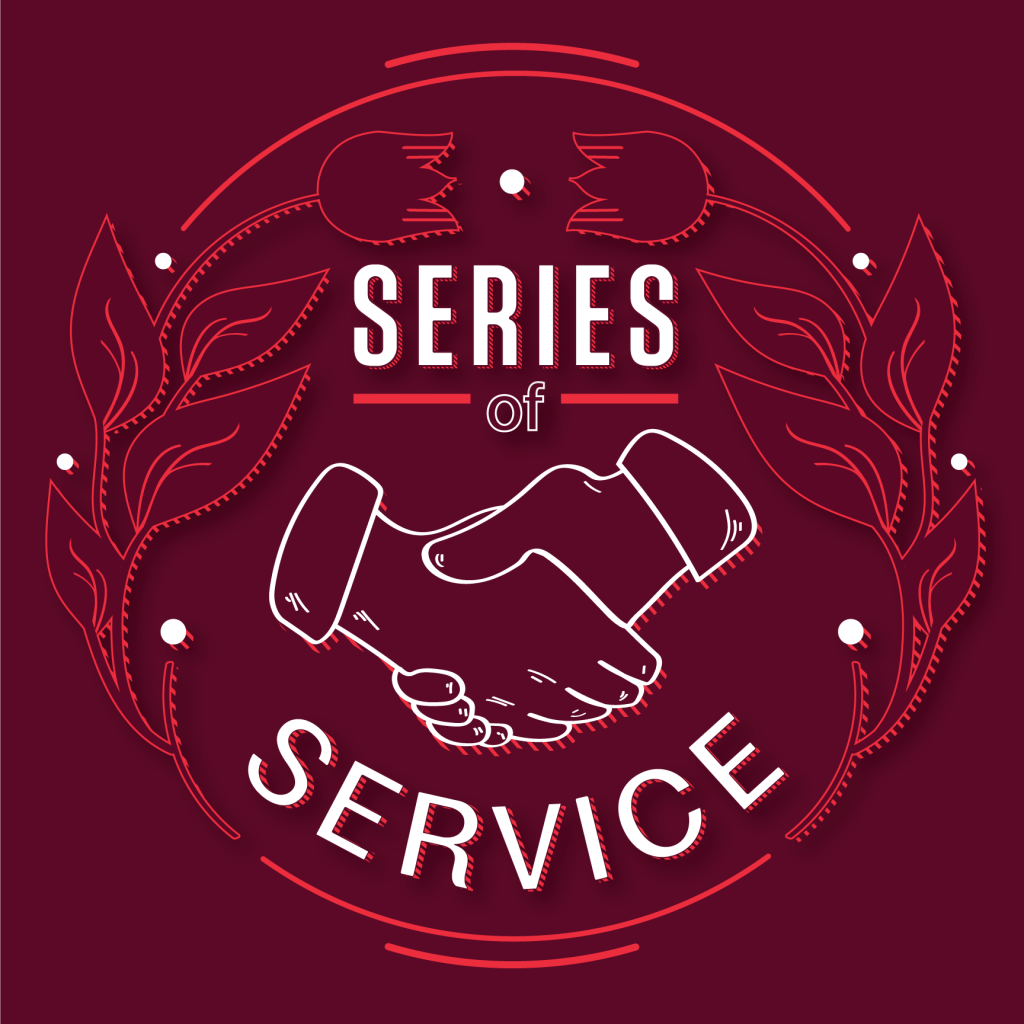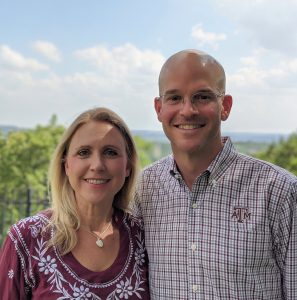Brian Smith ‘92: A selfless liberal arts graduate and successful C.E.O.
This C.E.O. learned hard work young and pairs his excellent work ethic with his liberal arts education both in his career and philanthropy.

By Rachel Knight ‘18
Editor’s Note: This story may not acknowledge or reflect the challenges of a global pandemic; however, we believe stories like this from the College of Liberal Arts provide an important source of light during these dark times.
They serve as a reminder that Aggies make a difference in the best and worst of times. We hope you find inspiration in what you are about to read, because you continue to inspire us. Thank you for all that you do.

Brian ’92 and Stacy Smith ’94 selflessly serve the College of Liberal Arts by using their excellent work ethics and liberal arts backgrounds.
Brian Smith ‘92 is no stranger to hard work. He held his first job at his parents’ restaurant in the second grade, ran a lawn service business while also working various jobs to pay for college, worked his way up through the investment business shortly after graduating, started a wealth management company with three other young go-getters, and successfully grew and ran that wealth management company until 2013 when they sold it.
Smith still works hard today as C.E.O. and managing member at Smith Texas Enterprise Ventures LLC. Though this role keeps him busy, he still makes time to serve Texas A&M University and the College of Liberal Arts. In fact, the following interview, which was condensed and edited for clarity, was conducted over the phone as Smith worked from a $10 million commercial development project jobsite.
Tell me a little about your childhood.
I was born in Cincinnati, Ohio. My dad’s degree was in chemical engineering, and he was supervisory engineer for Procter and Gamble when I was born. We moved from Cincinnati to Elkhart, Indiana, and lived there a few years when I was a young kid while Dad worked as a manufacturer and supervisor for White Hall Laboratories, the company that made Advil.
When I was 7 we moved to Fort Worth, so I consider Fort Worth the place I grew up. My parents bought a restaurant in Fort Worth from some friends, and that’s what brought us to Texas. That was an unsuccessful venture. They had the restaurant for about five years. My dad and mom both worked full time plus they ran the restaurant. They wound up having to close the restaurant, and that was pretty hard financially on us.
I worked in second grade at my parents’ restaurant. Then when I was fourteen, I started working at a barbecue restaurant as a dishwasher. I worked at a Chick-fil-a all through high school just to pay my expenses. I bought my car, had to pay for gas, and paid for college.
How did you decide to attend Texas A&M?
After I graduated from Southwest High School in 1988, I spent my first semester in college at Texas Christian University on a partial scholarship. TCU felt too small though, and even on a half scholarship, I had to work four days a week to cover my half of expenses. Within a few weeks I felt like I’d made a mistake.
I had some friends who went to Texas A&M, and I’d gone down to visit them. I realized while visiting my friends who were at Texas A&M that I really loved it. I loved that it was big, and for me that was something totally different. So, I applied to transfer to Texas A&M. I started my second semester in the spring of 1989 at Texas A&M, and loved it!
How did you pick history as your major?
I never liked history in high school. I always liked math and science. But my first semester at Texas A&M, I would hang out after Dr. Pisani’s U.S. history lectures to talk to him about what he’d lectured on, because I was so interested in it. I would tell him how much I enjoyed history, and that I liked it so much I was going to minor in history.
Finally one day he said, “Have you ever thought about majoring in history?” It was such an obvious question, but I honestly said, “No I really haven’t.” After that conversation, I changed my major to history and I minored in political science.
How have you used your liberal arts degree in your career and life so far?
I would sum that up in one word — communication. I started, ran, and sold a wealth management firm in Austin over a period of about 25 years. As the C.E.O. of that company, I had to do a lot of verbal and written communication. I had to deal with a lot of legal documents, reading, editing, and writing. My liberal arts degree prepared me really well for that.
The liberal arts showed me how to take complex ideas, emphasize them, and turn them into a relevant argument that could be communicated easily and interpreted relatively quickly.
Has your liberal arts education helped you in any way in the COVID-19 pandemic?
Yes. It has helped me have a really broad, long-term perspective, because we have been through other global challenges before. As a country we have been through other devastating moments in history. Every time, we have survived them and come back stronger.
Right now we’re in a period where there’s a lot of fear and a lot of uncertainty, but I have faith in our country and I have faith in our leaders. I have faith in the power of the private market and innovation, and we will prevail. I just keep telling people I talk to that this will pass. We will have challenges. We will have scary times, but this too shall pass. As a country we’ll prevail.
I understand that the Stacy A. ‘94 and Brian E. Smith ‘92 Endowed Scholarship in Liberal Arts was actually inspired by your relationship with a first-generation student. Tell me a little about that.
I served on the scholarship committee of the Capital City A&M Club numerous times over the years. We awarded 10 scholarships each year. One year, a particular applicant caught my eye who I felt strongly deserved a scholarship. I found myself in the committee meeting advocating for this applicant.
When we finalized our 10 recipients, committee members had the opportunity to volunteer to reach out to recipients and notify them that they’d been chosen. That year, I volunteered when the candidate I advocated for was chosen. When I called him, I shared the news, and he was very excited and very happy. I also offered to provide transportation to our Muster ceremony at the state capital, which is when we awarded the scholarships.
As I drove him and his family around that day, I really got to know them. That particular scholarship recipient is not only a first-generation college student; he’s a first-generation American. He came here in the eighth grade and didn’t know English. He is a remarkable person.
He graduated Phi Beta Kappa from Texas A&M at the top of his class. He has gone on to receive his masters from Harvard and is currently in the Ph.D. program there. He’s worked hard. He’s busted his butt. He’s overcome so many obstacles to achieve great success. He’s a phenomenal young man and leader, and I know he’s going to go on and accomplish even more great things.
One of the things I said to him early on was, “You are getting an opportunity to get some doors opened for you and to have some help up. When you’re older and established, the obligation is you have to go back and serve and help others.” He’s done that and he continues to do that.
Why did you decide to further your service to fellow Aggies by taking on a leadership role in the LADC?
One of the things Texas A&M teaches us is the importance of selfless service and leadership and loyalty. For me it’s a natural manifestation of those core values. Just like I said to my friend, there’s a certain level of obligation of responsibility that comes with receiving from others. I learned a lot at Texas A&M from the people who had come before me.
How has your involvement with the LADC and with other organizations in which you get to give back impacted you?
One of the ways it impacts me is that I get to meet wonderful people and make some really wonderful friends. It gives me a chance to spend time around excellent leaders. Our excellent dean, Dean Matthews, is a phenomenal leader. She exhibits servant leadership and lives it on a daily basis. She has excellent communication skills. She takes the time to write hand-written notes, which communicates the impactfulness of your actions.
As a leader, it is really valuable that she takes the time to do that. I’ve had the good fortune to receive a few notes from her over the years, and each time I get one, it’s powerful to receive and know that’s a very busy woman with thousands of people (when you think of all the students) who count on her. She has a lot of demands and a lot of people pulling at her and demanding her time, and yet she is able to take time and make people a priority and make them feel special and important. That’s a real gift as a leader.
Why is it important for people to support the College of Liberal Arts at Texas A&M University specifically?
One of the most obvious reasons is that we as a college touch more Texas Aggies than any other college. More students at Texas A&M University participate in our curriculum than the curriculum of any other college. What better way to make sure you’re touching as many lives as you can than by supporting the liberal arts?
The College of Liberal Arts doesn’t teach people what to think. It teaches people how to think. I don’t mean to diminish the value of teaching people how to be an engineer or how to function in business. Those are obviously important and very valuable as well, but liberal arts is the college that has the broadest impact. As such, it’s worthy of our support — both our treasure and our time and talents.
What books are on your nightstand right now?
The current book I’m reading is called Mind Hunter: Inside the FBI’s Elite Serial Crime Unit by John Douglas and Mark Olshaker. It’s about the history of the behavioral analysis unit of the FBI.
I also just finished reading Educated. It was such a great story! I absolutely loved it. She reminded me of the first-generation college student I talked about earlier. They are two people who have overcome an awful lot. They have phenomenal stories of challenges in their lives, but also phenomenal stories of success and overcoming those challenges and coming out on top. That’s all I could think about when I was reading her story.
What do you want your legacy to be at Texas A&M University?
I’ll leave legacies up to other people. I don’t want to have input on what my legacy is. I want to just be quiet, keep my head down, do what needs to be done. I’ll let other people be the judge of what a legacy of mine should be in the end.
